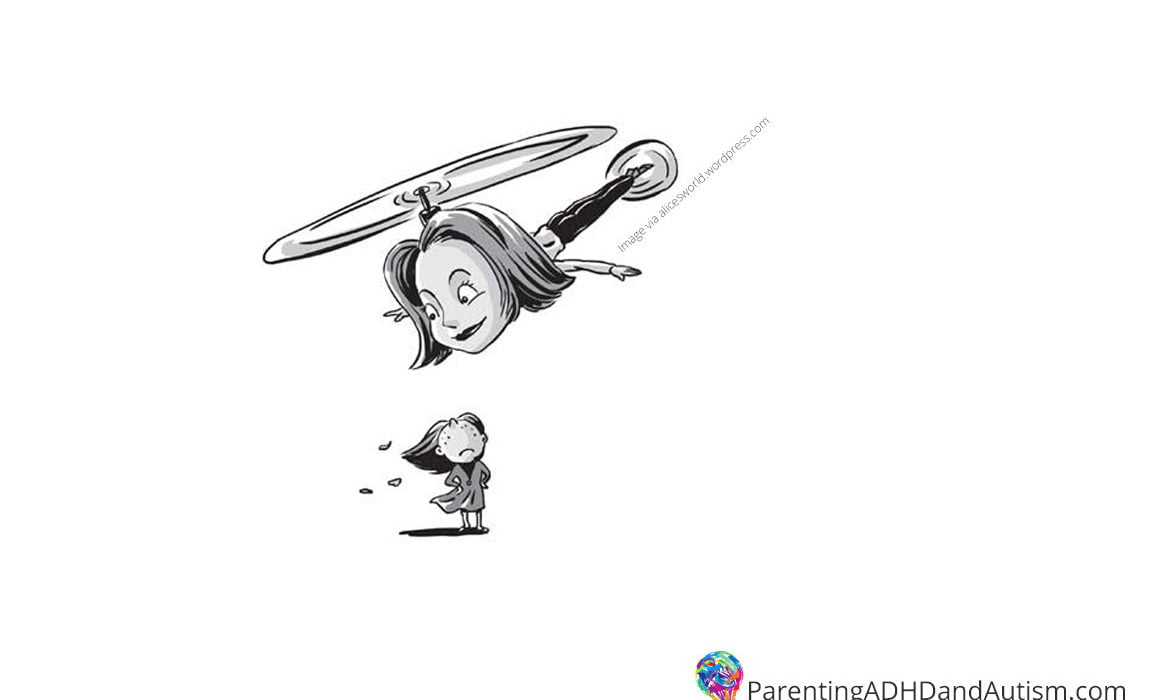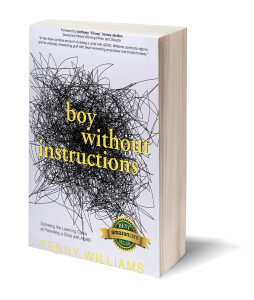Excerpt: “Boy Without Instructions,” I’m a Reformed Helicopter Mom
Excerpt from Boy Without Instructions: Surviving the Learning Curve of Parenting a Child with ADHD, by Penny Williams
Hi. My name is Penny Williams… and I’m a helicopter mom.
Excuse me, I was a helicopter mom. I worked very hard to reform this behavior and relinquish my pilot’s license. I hate flying anyway! [more…]
By definition, a helicopter parent is: “a mother or father that hovers over a child; an overprotective parent.”
Yep, that was me alright. I was a master hoverer. My son, Ricochet’s ADHD counselor had been harping at me about this for quite some time.
“You need to let him fail at some point,” she always said — firmly, but with compassion. “You need to step back, let Ricochet do whatever he can or will, at whatever success level comes with it, and then experience the natural consequences.”
You want me to let my child fail?!
Her suggestion to let my child be unsuccessful certainly fell on deaf ears the first six months she tried to convince me it was a requirement. I didn’t even try to refute it. To engage in conversation about it would have acknowledged such words were uttered, and I was not ready to hear that yet. I pretended she never suggested such a wicked thing.
I then debated this behavior modification proposal with her for at least another six months. I wasn’t ready to accept that the best course of action for my son might actually be to sit back and watch him fail, but I couldn’t resist the debate any longer.
“How does letting Ricochet fail help his already poor sense of self?” I’d argue.
“If I can help him, why wouldn’t I?” I’d ask from deep within my big momma heart.
“Isn’t it at the essence of a parent’s job to not let their kids fail? Aren’t I supposed to be his protector?” I’d plead.
Sitting on my hands, biting my tongue, and watching my child fail went against my very nature. I was a worrier by both genetics and environment. I’ve always had high anxiety, especially in social situations. My number-one motivator most of the time is fear — fear of failing, fear of being less than perfect, fear of being judged by others — we’re all driven by fear to some degree, but arguably a lesser degree than I am. I cringed at the thought of my child feeling physical pain. I could be driven to tears imagining how my kids felt when their feelings were hurt. Thinking the unthinkable, kidnapping or worse, sent me straight into an anxiety-fueled tailspin. Why would I let that happen if I could prevent it? My job as momma is to protect my children, to stand firm between them and harm.
Admittedly, I had taken that philosophy too far. I was a textbook hoverer. I over-thought every scenario. I weighed the pros and cons days in advance for every situation there was even the slightest possibility might surface.I tried to anticipate the severity of the risk. For heaven’s sakes, my children did not go outside to play the five years we lived on the mountain, because several times a year we had black bears roaming our property and traipsing up to our door. The bears never approached when we were outside. They were only around our house approximately 1/50th of the year. Those odds weren’t bad, and yet I focused on the what-ifs until the thought of letting them outside seemed like child neglect or potential manslaughter by bear or something. What was I thinking? Well, I was over-thinking, and that’s a hallmark of a helicopter parent.
Our counselor’s point, though, and it was a good one, was not to push Ricochet aside and let him fail or let him get hurt. Her point was that I had to teach him the skills to work around his challenges, and then step back and let him find his own way from there. Not only would that force him to step up and do the work, but it would also give him the breathing room to develop his own compensatory measures for his ADHD and learning disabilities. After all, kids are most successful when they do things their own way. Aren’t we all?
At some point after receiving this advice numerous times over a year, I accepted the reality that I was a helicopter mom, interfering in my children’s lives entirely too much. Of course, it was my job to care for them, but it was not my job to do everything for them and foresee every danger. I couldn’t put them in a bubble and lock out the world so they didn’t experience hurt. Hurt is a part of life, and mistakes teach us valuable lessons and make us stronger. Babying them could actually make them weak.
That revelation bears repeating: Babying my children could actually make them weak. That awareness was profound.
My hovering over Ricochet’s every move, poised and ready to cushion his fall or prevent emotional pain, was holding him back. It also fueled arguments and power struggles. I was setting the fuse for repeat explosions.
There was a measurable improvement after I relinquished my pilot’s license and stopped hovering (most of the time). Leaving Ricochet to discover and try led him to figure out how to be more like his peers in the ways he needed to be, when possible. He was happier doing things as his peers did, I guarantee. I consistently had to sit on my hands, zip my lips, and let him try.
My son was a happier kid after I quit hovering over and around him all the time. Ricochet’s older sister was happier, too. And I am certainly happier not feeling like I have to worry so much about the fate of my littles. What doesn’t kill us makes us stronger, right? Okay, let’s not get carried away — I’m not ready to go that far yet! I could relinquish a lot of control without risking safety, and that’s just what I did… successfully.
This is an excerpt from the book Boy Without Instructions: Surviving the Learning Curve of Parenting a Child with ADHD. The book is available in paperback and kindle on Amazon.com now!





